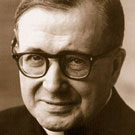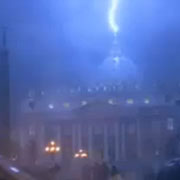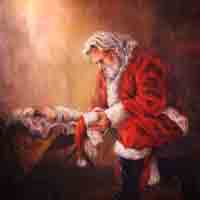Today was the feast day of a saint who is very dear to me. In St Josemaría Escrivá I see an inspiring model for current-day priests, engaging with a secular and in some respects ‘post-Christian’ culture.
Well, I would say that, wouldn’t I?, since I am a member of Opus Dei. But that’s confusing the cart and the horse. I was attracted to Opus Dei only after reading and coming to love St Josemaría.
When I left home at 18 to study in Melbourne, I was both idealistic and sceptical. At 18, who isn’t? I was attracted to Christ and his Gospel, but I was disillusioned with a Church which was bereft of authority. The scandal of clerical abuse and its cover-up was in the headlines and on my mind, and lacklustre liturgy and preaching didn’t help either.
My Catholic identity was tenuous. I may have been easy prey for the evangelical Christians on campus, except that my childhood love of the saints — St Thérèse especially — had not left me. The distant figure of Archbishop Pell also commanded respect, if only because he spoke boldly and against the tide, and he had been chaplain in my first years at primary school. Still, I did not know personally any priests, nor did I want to. I doubt I’d ever have changed denominations, but I was probably on track to become a “mere Christian,” cultivating a personal spirituality and private prayer life, independent of “organised religion.”
Nonetheless, one’s first year at university is a time to explore everything. I attended the meetings and functions of all sorts of clubs and societies, from the fickle (the Chocolate Appreciation Society; the Free Beer Society) to the radical (the Socialist Alliance; the Citizen’s Electoral Council). I watched the Students for Christ debate the Humanists, and I joined an evangelical Christian book club. An invitation to dinner at an Opus Dei study centre was just one more function to add to the list. I was supposed to attend a preached meditation (whatever that was), but I was running late, and arrived just in time for Simple Benediction. The presence of a fully fledged chapel in a suburban house — not to mention the unfamiliar sight of a priest in cassock and the alien sound of Latin (the ritual concluded with the Salve Regina) — quickly convinced me that I had encountered a cult which was far removed from mainstream Catholicism. Nonetheless, I enjoyed the conversation and debate at dinner, which covered such diverse topics as the best imported beer, the Australian wheat price, and the cultural influence of Peter Sellers. Much to my surprise, religion wasn’t mentioned at all.
Subsequent invitations to meditation and dinner were gladly accepted, and I was impressed by the spiritual content of the preaching, and the easygoing warmth of the rest of the evening. This stood in stark contrast to my encounters at the evangelical book club, which were terminated after my Catholic background was discovered, and I was forcefully and repeatedly subjected to anti-papist rants.
Still, I sustained a polite disinterest in Opus Dei until I was given a copy of The Way, a small book of spiritual maxims which made “Father Joseph Mary Escriva” famous decades before anyone had heard of Opus Dei. Several weeks passed before I picked it up, but when I did I couldn’t put it down. Its insights startled me. It was as though Josemaría had read my heart and mind, and spoke directly to me. Moreover, there was a warmth and attractiveness to his style which had me looking for more.
It all happened quite gradually of course, but looking back, I think it’s fair to say that St Josemaría taught me to love the Church just as I already loved Jesus Christ. Thus this video — which I had not seen before today — is a very apt illustration of that style:
I think it’s also fair to credit St Josemaría with my priestly vocation. Years before I thought of becoming a priest, I thought of becoming a saint. That has its roots in my discovery of St Thérèse’s “Little Way” at eight or nine, and Mum’s assurance that God calls us all to be saints. This is St Josemaría’s message too, and I was able to discern a priestly calling only after adopting the sort of prayer life he recommended for lay apostles.
There Be Dragons is an average movie of uneven quality, but it does a very good job depicting St Josemaría’s vision. I’m proud and humbled to call myself one of his spiritual children.






Many thanks for this interesting post.
You may be interested to read about how the simple mortifications of the Irish Jesuit Fr Willie Doyle inspired St Josemaria:
http://fatherdoyle.com/2012/06/26/thoughts-about-fr-doyle-from-st-josemaria-escriva/
Thanks PKenny. I became very interested in Fr Doyle just after my priestly ordination last year. I think I’ll blog on it in the next day or two!
Hey Father,
I went to the Solemn Mass at St. Mary’s tonight and was wondering if I would see you there. You might be interested to know that it went very well, the church was packed, the sermon was passionate, and there were a ton of young adults and large families in attendance. A great way to celebrate St. Josemaria.
Which St Mary’s?
I’m in Sydney at present, attending the ACCC Conference, so I couldn’t get to the mass at St Mary’s, West Melbourne. And the formal conference dinner prevented me from attending the mass of St Josemaría at St Mary’s Cathedral, Sydney.
I understand that in Melbourne, the nuncio preached something of a marathon homily!
Hello Father,
I mean the Mass at St. Mary’s in West Melbourne. The sermon was definitely a marathon, although with lots Italian-style hand gestures and impassioned delivery.
Thank God you were rescued by Opus Dei, Fr John. And thank you for sharing your vocation story.
After decades of viewing out-of-focus Catholicism tasting like fairy floss (to mix metaphors), seeing Opus Dei in action in a parish is like finding the One True, Catholic and Apostolic Church. It’s Vatican 11 in action.
“An invitation to dinner at an Opus Dei study centre was just one more function to add to the list.”
At uni, I’ve never encountered such opportunities, how’d you score the invitation and where is their study center in Melbourne if you don’t mind me asking?
Yeah, I too have fount ‘the way’ quite helpful! Well, the parts I’ve read.
Thanks for this post! I can relate to the stuff you said about beginning uni and the gradual spiritual development an all. For me, six30 @ st Pats has been huge.
Thanks again father!
The study centre is in Carlton — just a couple of blocks from Melbourne Uni (and only one block from Lygon Street!). One of the residents there was in my philosophy classes. Later on, he moved out of the centre (which is a student residence), and we were flatmates in north Carlton. Later still I moved into the centre and finished my degree there.
The meditation and dinner for university students is still a weekly fixture, I’m sure. There’s also provide silent recollections and weekend retreats. Give them a call.
Six30 had a big influence on me too. But if I mentioned every influence in one post, I’d have nothing to write in the future! Ha ha.
Dear Father,
Just to back up Jake’s post(s). There was a grand crowd at West Melbourne on Tuesday night. The Papal Nuncio’s homily was lengthy but pertinent. Above all it was organized. I have heard much shorter homilies that, unfortunately, went nowhere. Like student essays the homily should have relevance to the readings and Gospel. Fr Foote at Monash gives short but ‘spot-on’ homilies at daily Mass, when I am able to attend. Finally length of a homily seems to be a modern concern. From memory St Alphonsus was one never to ‘mince’ or shorten his words.
I think you’re right that length of homily is a modern concern, but for good reason. Attentions spans have diminished a great deal in the TV age! Also, sermons used to be delivered outside mass, often on a Sunday afternoon. People turned out for some good preaching, and they expected something substantial. Most of Bl John Henry Newman’s excellent sermons were delivered in this context.
These days however, I think the rules are different. “If you haven’t struck oil in five minutes, stop boring!” I average seven minutes myself.
Not that I want to suggest the nuncio’s homily was too long! I wasn’t there for a start. But apart from that, it also sounds like it was a good one!
How d id the seminaryauthorities taketo your devotion to StJose?
When I applied, my affiliation with the Work was explicitly raised – as a positive. Perhaps one or two staff members expressed their reservations at one time or another, but given that my involvement was never as secretive as Opus Dei is accused of being, and more importantly because my successive ordinaries had no problem with the Work, the seminary had no problem with the Work.